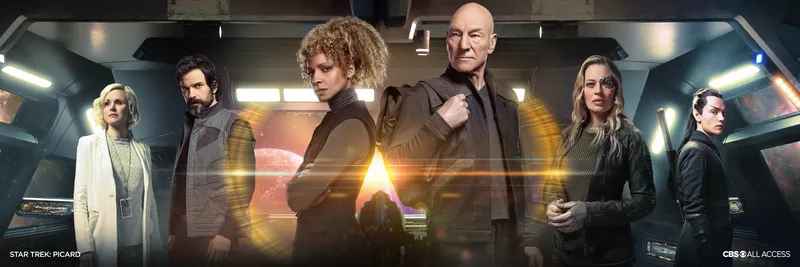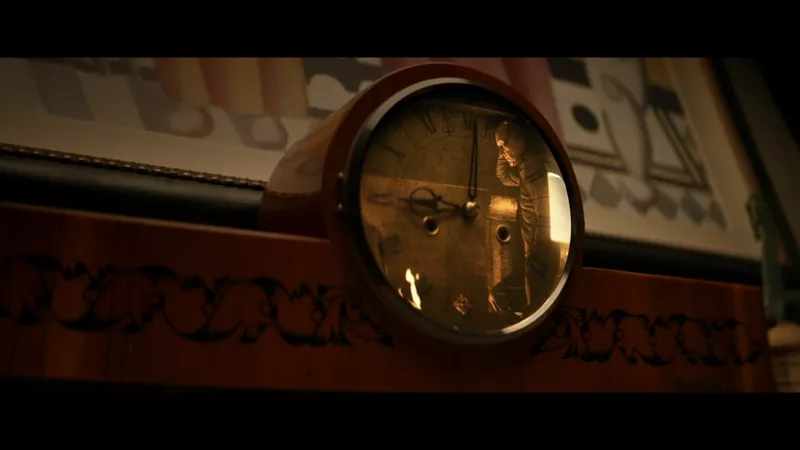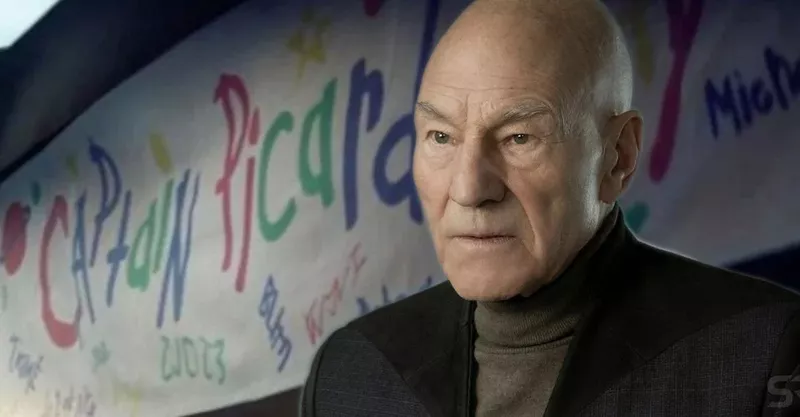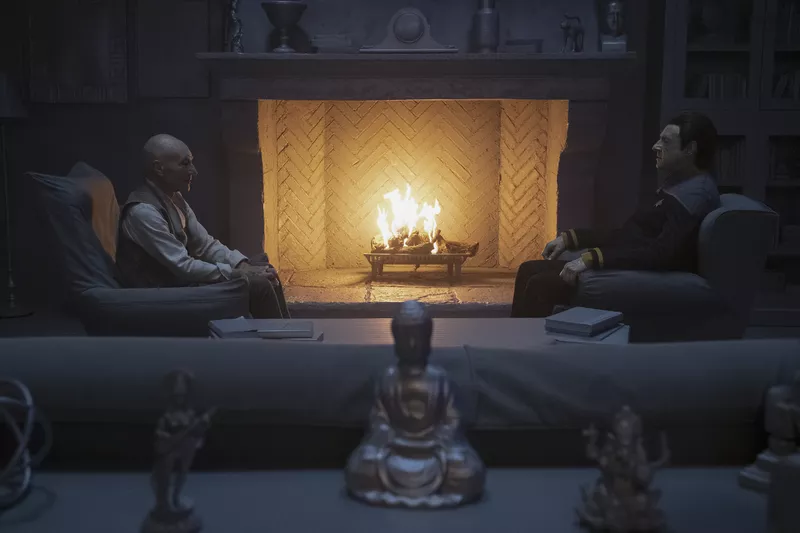
Throughout the past decade, in 2013, 2015, and 2018, I've written about what I believe to be the core of Star Trek and how a new series should carry on this important legacy. I am thrilled to report that Star Trek: Picard has fulfilled and surpassed these expectations. Let's explore the criteria I listed previously and then dive into a detailed review of season one. WARNING: major spoilers for Star Trek: Picard are below.
The Prime Universe After Nemesis
Star Trek: Picard takes place in the Prime Universe almost 20 years after the events of Star Trek: Nemesis. This allows it to draw upon the rich history of events established in earlier series while introducing intriguing new technologies like holographic starship controls and new sociopolitical situations like Romulans living on Earth and The Artifact. It really feels like this is the next chapter in the Star Trek story.
Relaunch Novels
Not surprisingly, Star Trek: Picard does not canonize events from the relaunch novels. However, as detailed on /r/DaystromInstitute, some intriguing concepts from the novelverse have been incorporated in some form into the show:
-
The Cold Equations series tells how Dr. Noonien Soong transferred his mind into an advanced android body shortly after the events in Brothers (rather than dying as he lead his sons to believe). After Data died, he worked in secret to create a replacement body for Data and planned to transfer his consciousness from B4 into the new body before it degraded inside B4, but it was destroyed before he could do so and in an act of sacrifice and love for his sons, he transferred Data's consciousness into his own android body so that Data could live. This bears resemblance to how Alton Inigo Soong was working to transfer his mind into a synthetic body though he ultimately gave up the body so Picard could use it and also how he transferred Data's memories (albeit an incomplete copy of Data) out of B4.
-
Immortal Coil introduced the concept of the Fellowship of Artificial Intelligence, an organization of synthetic beings. Cold Equations introduced The Body Electric, a part of the Fellowship which seek out synthetic life and in the process destroys organic life. This sounds very similar to the synthetic beings that left the message for synthetics to discover in Star Trek: Picard.
-
Immortal Coil also features Bruce Maddox as an advocate for synthetic life and continuing to work on creating new androids.
Character Development
As mentioned in previous posts, I believe strong character development is a key ingredient in a successful series. Babylon 5 serves as a shining example of rich, three-dimensional characters and growth and evolution over the course of the series. While Star Trek: Picard is still only just beginning, there are several examples of rich character growth thus far:
-
Jean Luc Picard: in The Next Generation, Picard is a strong leader in a position of authority who is well-respected. When Star Trek: Picard begins, this couldn't be further from the truth. From the ensign who didn't recognize him when he went to Starfleet Headquarters, to Admiral Clancy's dismissal and refusal to help him, he is repeatedly confronted with peo,ple who are hurt by, disappointed in, or angry with him (more examples include Raffi, Elnor, and even Seven of Nine). Finally this barrage of negativity towards him is broken when is reunited with Hugh; at last, someone is happy to see him and wants to help Picard. His evolution continues as he comes to grips with the hard realization that the xBs are not what he remembers the Borg to be
-
Hugh: from I, Borg to Star Trek: Picard, Hugh has evolved from a simple Borg drone to an individual who has reclaimed much of his humanity and is working tirelessly to grant countless other Borg this same gift. His warm appreciation of how Picard believed in him and gave him a chance and strong willingness to help Picard now in his time of need stand in sharp contrast to his more cold, untrusting feelings in Descent.
-
Seven of Nine: it is incredible to see how Seven of Nine has evolved from the end of Star Trek: Voyager - having regained much of her humanity and now working to help those who have no one else to help them. Her disillusioned view of Starfleet and the Federation clash sharply with Picard, whom she views as a symbol of all that they should represent but no longer do. Despite her bitterness, she comes to embrace at least a measure of Picard's worldview through Elnor's devotion to help Hugh and the xBs. She grows to face her fears of returning to the collective, albiet briefly, in order to save the xBs and subsequently come to Picard's rescue at Coppelius. Most poignantly, her discussion with Picard about her lost humanity is very powerful:
-
Raffi: while Raffi is a new character, it feels like we have known her for much longer with the rich history she has with Picard and their shared devotion and belief in doing whatever was necessary to rescue the Romulans. Her struggle to recover from that devastating failure as well as the loss of a relationship with her son are both very moving. Despite all of that, she still finds it within herself to help Picard, despite his past failures.
-
Rios: coming to know Rios through the multifaceted personalities of each of his holograms (as well as the real Rios) has been an interesting way to unfold the mystery of his past and his history with Soji's people.
-
Soji: the story of Soji remembering who she really is and being forced to choose what type of person she wants to be is a wonderful parallel to Picard's concurrent journey of finding himself again.
-
Riker and Troi: it is incredibly heartwarming to see Picard reunited with these two old friends. Moreover, Deanna immediately senses that he is not well (likely the brain defect) and both of them realize that Soji is not human. As Riker said, "I'd recognize that head tilt anywhere". They have both moved on from Starfleet, struggled with the tragic loss of their son Thad due to the ban on synthetics, and aspire to raise their daughter Kestra in peace. Nevertheless, they come to Picard's aid and Riker even rejoins Starfleet briefly to lead the fleet to Coppelius to defend Soji and her people from the Romulans.
Good Planning and Consult with Experts

As I noted previously, I think telling a longer story arc allows for a richer, deeper story to develop. Star Trek: Picard delivered on this with a conhesive story that weaves threads from prior series (such as Hugh and his relationship with Picard, Bruce Maddox and his obsession with Data and synthetic life) while also introducing new elements that fit well with canon. It is clear that the creative team is very familiar with the Star Trek universe and dedicated to telling a story that fits in with established canon. Moreover, having Sir Patrick Stewart as an executive producer helps to ensure that Picard is portrayed accurately.
The attention to detail and history in composing the theme song is remarkable. Even more amazing is when you listen to the song Kamin's son composed and can hear the Star Trek: Picard theme song in it!
I also think the quality of the cinematography is wonderful. It feels like many of the scenes were very well devised, from the colors and textures to the details and creative shots (such as the above shot featuring Picard as viewed through an antique clock on his mantle).
Themes
There are several powerful themes woven into the first season:
- The 94-year-old can still make a difference - Star Trek: Picard makes the case that no matter your age, you can make a difference. While certainly showing Picard's age at times (e.g. when he got winded climbing up the stairs with Dahj or Laris and Zhaban defending him), the show also demonstrates that even an elderly, retired Admiral can defend what is right and save a life
- Picard finding himself again - When we first meet Jean Luc Picard again, he is a shadow of his former self, plauged by feelings of guilt and remorse for Commander Data's sacrifice and for failing to save the Romulans before the Hobus star went supernova. As he admitted, he had lost any sense of purpose in life. In an instant, this changes when he meets Dahj and continues to build until the last episode, when in true Picard fashion he sacrifices himself to protect lifeforms threatened with extinction
- Acceptance of others who are different - just as he did in The Measure of a Man, Picard vigirously defended the rights of all lifeforms, whether Romulan or synthetics. This theme is further explored through the xBs and their role as former drones. Through Hugh's guidance, Picard learns to view them in a new light despite his history with the Borg
As Patrick Stewart observed in the final episode of The Ready Room, the world needs Star Trek and in particular the strong leadership and moral conviction of Jean Luc Picard right now. Not only does Star Trek: Picard explore important philosophical issues, it is also a lens through which contemporary events are reflected back at us as Star Trek has always done.
Picard and Children
It is well-established in The Next Generation that Jean Luc Picard is uncomfortable around children - from his relationship to Wesley Crusher to how he relates to the children in the turbolift in Disaster. Nevertheless, as the series evolves, evidence mounts that while Picard is uncomfortable with children, he wishes he had children of his own.
First, in Family he forms a bond with his nephew, René. Later after his brother Robert and René are tragically killed in a fire, Picard reveals how he viewed René like a son:
This is further explored in his experience in The Nexus, where he imagines himself with a wife and children. This sentiment is also echoed in The Inner Light when, as Kamin, he decides to have children. In Star Trek: Picard, it is revealed that Picard kept the Captain Picard Day banner from The Pegasus:

Clearly, this gift that the children of the Enterprise made meant something to him. Moreover, he acts as a father figure for Elnor until he is pulled away by the attack on Mars. Therefore, it is fitting that when he meets Dahj and Soji, he treats them as surrogate children. He devotes himself to saving Soji and once they reach Coppelius and realize what is at stake, he sacrifices himself to save Data's children and also teach them of the need to respect all life:
Picard: As you said they are children. And until now, the only teachers they've had are a couple of hermits. And the fear of extermination. But fear is an incompetent teacher... To be alive is a responsibility as well as a right.
Jurati: How are they supposed to learn that lesson in 6 minutes?
Picard: The way that children learn most things: by example.
Picard and Data
Central to season one is the relationship of Picard and Data. Throughout The Next Generation, the movies, and now Star Trek: Picard, Captain Picard has acted as a teacher for Data during his exploration of humanity. Moverover, Picard and Data save each other several times:
- In The Measure of a Man, Picard vigorously defends Data's rights and prevents him from being disassembled to be studied
- In Descent, Picard helps Data overcome Lore's influence and regain his conscious
- In All Good Things, Professor Data is the only one who entertains what is happening to Picard seriously and is responsible for helping him discover the truth about the anomaly
- In Star Trek: Nemesis, Data sacrifices himself to save Picard
- In Star Trek: Picard, Picard attempts to save Dahj but fails. He then successfully saves Soji, Data's other daughter, and his brother Alton Inigo Soong
This faith in each other serves to further emphasis the bond between these two people and Picard's firm belief that all life is precious, including synthetics.
The Big Goodbye

This powerful scene brings the closure that Picard had desperately needed for so long by finally letting him express to Data how much he cared for him and valued his sacrifice. Data, in turn, explains that just as Picard didn't regret sacrificing himself to save Soji and her people, so too did Data not at all regret his sacrifice to save Picard. It is fitting then, that as Data saved Picard, now Picard can help save Data from an eternity trapped in a machine and give him the experience of mortality. This scene is even more moving when you realize that it is Data's daughter Soji who sings Blue Skies during Data's final moments.
Picard Reborn

As the theme of rebirth has played a pivotal role in Star Trek: Picard, this culminates with the literal rebirth of Jean Luc Picard in a synthetic body after his human body dies from the brain defect. This symbolizes his rebirth as the man he once was, full of conviction and purpose. Moreover, it furthers the discussion about synthetic rights and what it means to be alive. It is a wonderful full circle theme that Picard advocated for saving synthetic life and now he himself is saved by synthetics. It also adds additional depth to the story in that the brain defect ties this back to the potential future Picard experienced in All Good Things.
Reborn and with his sense of purpose restored, the sky's the limit for season two!
Footnotes
- Images unless otherwise noted are from Trekcore
- The Captain Picard Day banner is from here
- The image of Picard reflected in the clock on the mantle can be found on Reddit
- There is no concern with Picard's rebirth that this is not the real Picard, as using a transporter has the same effect (consciousness is transferred but the original matter is not)
